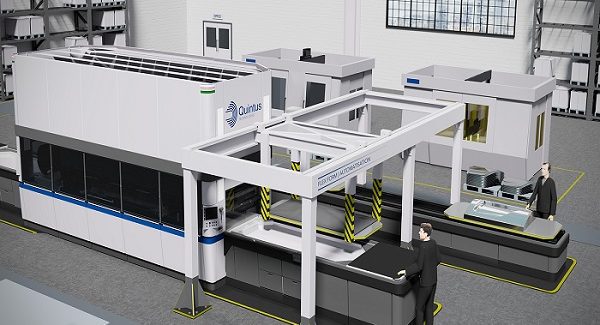Cost Effective Forming of Various Part Shapes in Small Production Batches
The Flexcell system from Quintus Technologies is based on Flexform technology that uses a single rigid, shape-defining tool half in conjunction with a flexible rubber diaphragm under high hydraulic pressure to form complex-shaped sheet metal parts to close tolerances with little or no manual rework.
Posted: September 27, 2018
In Booth A-1745, Quintus Technologies® AB (Lewis Center, OH) will introduce their Flexcell™ fluid cell press technology, a cost-effective system for forming high quality, low volume sheet metal parts. The Flexcell system is based on Flexform™ technology that uses a single rigid, shape-defining tool half in conjunction with a flexible rubber diaphragm under high hydraulic pressure to form complex-shaped sheet metal parts to close tolerances with little or no manual rework. The Flexcell concept minimizes the time for tool changes and new tool set up, substantially increasing productivity while allowing fabrication of small production batches when a wide a variety of part shapes is required. Ideal for dynamic industry sectors that demand ever-shorter lead times, Flexcell enables rapid trials and tool modifications after component design changes. Flexcell represents the next generation of Flexform production technology incorporated in the Quintus model QFC 1.2×3-1000 fluid cell press that generates a pressure level of 14,500 psi over a forming area of 47.2 in x 118.1 in (1,200 mm x 3,000 mm).
Also on display will be High Pressure Warm Forming (HPWF), a new process that combines high pressure with a moderately elevated temperature for more rapid, cost effective and precise forming of titanium parts that paves the way for more widespread adoption of Ti-6Al-4V, the grade of titanium prized for its high strength, light weight, formability, and high corrosion resistance. “In the aviation industry alone, market projections call for close to 35,000 new passenger and freighter aircraft to be built over the next two decades,” said Sture Olsson, the global business development manager of sheet metal forming at Quintus Technologies. “These new models will consume less fuel and have a lighter environmental footprint. The lightweight properties of Ti-6Al-4V are integral to a fuel-efficient design strategy.” HPWF removes barriers to fabrication that previously limited the use of Ti-6Al-4V to specialty applications due to the high cost of current forming methods.
https://youtu.be/gcSyicC-tFk
Conventional milling has a scrap rate that can approach 70 percent. Hot forming processes, which take place at temperatures of above 1,300 deg F (700 deg C), require an oxygen-free process atmosphere and entail several lengthy steps. HPWF significantly improves on these methods by introducing an induction heating system to warm the blank-and-tool package to approximately 520 deg F (270 deg C) – well below the temperatures where a protective gas is required – just before entering the Flexform press, which applies uniform high pressure (20,000 psi/140 MPa) to a flexible rubber diaphragm in conjunction with just a single rigid tool half to form complex sheet metal parts to final shape. A complete HPWF cycle, from heating and loading to forming and unloading, takes less than five minutes. Forming at relatively low temperatures enables quick cooling.
Overall, the efficiencies generated by this new process dramatically boost the production capacity for Ti-6Al-4V parts, increasing throughput by a factor of five over traditional hot forming processes.
Quintus Technologies AB, 8270 Green Meadows Drive North, Lewis Center, OH 43225, 614-891-2732, quintustechnologies.com.




